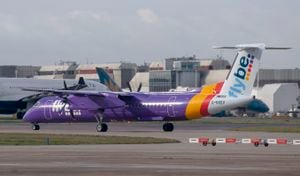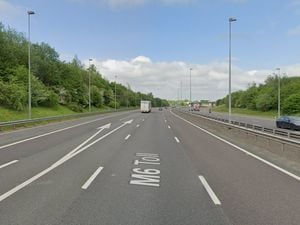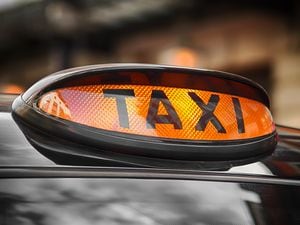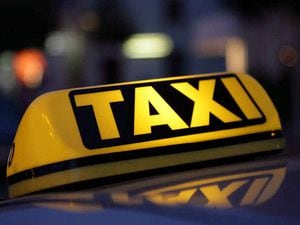Flybe the latest airline to head into turbulence
Just what is it that makes running an airline such a tricky business these days?

Still smarting from the loss of Thomas Cook last year, the UK air industry is now braced for more difficulties after Flybe bosses entered crunch talks with the Government to save the airline.
Bosses were locked in talks with the Department for Business, Energy and Industrial Stategy and the Department for Transport over the weekend, in the hope of gaining emergency cash to help keep the firm airborne.
And last night it was reported that Flybe was mounting a last-ditch plea to ministers to defer its multimillion pound air passenger duty (APD) bill as it hovers on the brink of collapse.
Europe’s largest regional carrier has asked Whitehall to help it find a way of delaying its APD payments, which would ease Flybe’s current cashflow crisis.
About 2,000 people are employed by Flybe, the Exeter-based carrier which was bought by a consortium consisting of Virgin Atlantic, Stobart Group and Cyrus Capital in February 2019 following poor financial results.
The group bought Flybe for just £2.2 million, but pledged to pump tens of millions of pounds into the loss-making airline to turn it around – but the talks with the Government suggest its requirements have been more severe than expected.
Flybe has been hit by a series of problems, including falling demand, rising fuel costs and the weakening of the pound.
If it collapses, it would be the second UK airline to fail in four months, following the demise of Thomas Cook.
And it could follow other recent UK airlines Flybmi and Monarch in being permanently grounded.
“Attracting new finance will be no easy task,” said Professor Loizos Heracleous, an aviation industry expert from Warwick Business School.
Regulation
“The aviation industry is an unattractive industry in terms of performance and returns on investment at the best of times. It is saddled with high-cost assets and key costs that fluctuate uncontrollably, mainly fuel, which accounts for about a third of total airline costs.
“On top of that they face high regulation, often aggressive unions, low barriers to entry that increase competition, and high bargaining power of buyers.”
The industry appeared to be growing in profitability after about 2011, aided by low fuel prices. But with an upward trend since 2016 making it more and more expensive to get off the runway they have struggled more and more to make ends meet.
“There will undoubtedly be more bankruptcies,” added Prof Heracleous. “For example, in 2017 we saw 79 new airlines enter the market, while 25 went bankrupt. The failure rate was even higher in Europe, where 29 airlines were started and 14 went bankrupt.
“In the medium to long term the European aviation industry may move towards higher levels of consolidation where the weakest players get weeded out or taken over.”
What may work in Flybe’s favour is the fall-out from Thomas Cook’s collapse.
MPs on the BEIS select committee were scathing of the department for how it handled the holiday’s giant’s collapse, and in particular Business Secretary Andrea Leadsom, who was criticised for not playing a more active role in discussions.
Brian Strutton, general secretary of pilots’ union Balpa, said he was “appalled” that the future of another airline “is being discussed in secret with no input from employees or their representatives”.
Diana Holland, assistant general secretary at the Unite union, added: “It is essential that the Government plays an active role in helping to ensure that Flybe continues to operate. It is not acceptable for the Government simply to prepare for failure.
Costly
“The Government must demonstrate that it has learnt the lessons from the collapse of Monarch, which it failed to apply during the collapse of Thomas Cook.”
However, aviation consultant John Strickland said: “I cannot see the Government doing much of anything except give warm words because they didn’t help out Monarch or Thomas Cook.
“I just can’t see a political will to get involved, so it’s going to depend on somebody putting money in.”
What, then, could the situation mean for people who have flights booked with Flybe?
The airline flies from Birmingham Airport, and is the largest operator of domestic flights within the UK, running 38 per cent of all planes that travelled within the country last year, but also flies from the West Midlands to European cities including Amsterdam, Geneva and Hamburg.
Flights came and went as normal yesterday morning, and both Flybe and the Government departments with which it is locked in talks remained tight-lipped about progress.
But Matthew Mills, a graphic designer from Craven Arms, fears its collapse could bring a great deal of inconvenience.
“We use Flybe as a family at least 10 times a year, with family flying from Germany and us flying to see them,” he said.
“If Flybe was to collapse it would have an impact on seeing family, finding a suitable airline that isn’t too costly for a family of four to fly over for a weekend.”





